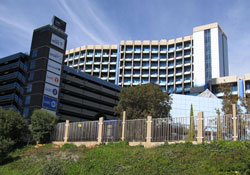
Top stories






More news


Marketing & Media
Ads are coming to AI. Does that really have to be such a bad thing?













The re-appointment of Dr Aaron Motsoaledi as health minister has dashed the pre-election hopes of the media, marketing and liquor industries that he would be reassigned as a result of the strong disagreement within the old cabinet of his plans for draconian bans on liquor advertising and sponsorship.

Early last year he announced that his ad ban legislation would be published "within weeks" but a number of his cabinet colleagues remained so unhappy about the impact on employment and numerous other aspects of the legislation that it was decided the health department should commission an independent impact assessment and that the matter be put on ice until after the elections.
Industry insiders believed that part of the reason for this was that Motsoaledi would be deployed to a different portfolio.
It seems now however, that when the new cabinet revisits this issue, the health minister will have fewer detractors and unless the anti-ad ban lobby effort can be revived and new members of cabinet made aware of the dangers of these bans, the media, marketing and liquor industries can expect renewed action on the bill within the next few months.
To put it mildly, things are looking pretty bleak.
It seems, too, that hard work, pragmatism and success are not attributes necessary for selection as a member of the cabinet in the Zuma administration.
It is breathtakingly ironic that former communications minister, Yunus Carrim, has not only been relieved of his post but has been dumped from the cabinet.
The only possible assumption at which one can arrive is that all those media reports about Carrim having achieved so much success in so little time actually led to his downfall.
While the media interpreted Carrim's decision-making to be in the interests of the greater good, the ANC it seems, merely saw Carrim getting his perspectives wrong by not putting what the ANC wanted ahead of what the country actually needed.
Someone who has been following the fortunes and misfortunes of successive communications ministers for a number of years now, TechCentral editor, Duncan McLeod, put it in a nutshell earlier this week saying, "Dumping Carrim was an absurd move."

He is quite right of course - it was absurd if in fact, one bases opinion on logic.
In terms of what the ANC wants, however, it is far from absurd. It is pure and simple prophylactic damage control.
Predictably, the SOS Coalition, representing trade unions, community media and content providers in the broadcast arena, was livid at Zuma's decision to consign Carrim to that wasteland of ministers who have dared put the interests of the people ahead of the interests of the party.
SOS claimed Zuma had even gone so far as to undermine some of the ANC's own policies let alone having messed with statutory and constitutional imperatives.
There is no question that the two new departments will be little more than propaganda machines and drivers for the ANC's PR effort.
South Africa, I reckon, should prepare itself for an entirely new level of ill-conceived spin as the ANC attempts to repair its crumbling foundations and build ramparts against the likes of an aggressive EFF and increasingly confident DA.
It is going to be interesting to see whether the new cabinet implements the decision made by its predecessor in terms of the impact assessment of the ramifications of banning alcohol advertising.
This alone will be an indicator of whether the health minister still faces opposition within the ranks of cabinet or whether he has effectively been given the green light to go ahead with his plans.
Early last year, a draft of his bill was 'leaked' to the media and in spite of protestations from his department, it was pretty clear that the leak was intentional in an effort to get an idea of acceptance or otherwise.

It was draconian to say the least, calling for a complete ban on all forms of alcohol advertising and sponsorship.
Needless to say the media, marketing and alcohol industries reacted with dismay and in a rare show of unity, actually put in place committees and strategies to prepare the ground for the time when a bill is eventually published and made available for public comment.
Those structures remain in place today and are ready and waiting.
Turning to the SABC, is clear that the new minister will be tasked with ensuring that the national broadcaster toes the party line.
And it is small wonder the ANC is so keen to have complete control of the SABC because when you add up all the numbers, it's the only source of information available to roughly 70% of the voting public of this country.
In terms of wining elections on a national or municipal level, control of the SABC is the key.
It is sad that South Africa has returned to the equivalent of the worst days of apartheid when it comes to restrictions on the freedom of commercial speech and access to information.
Carrim provided an immense spirit of hope to those desperate for faster and cheaper internet access.
Maybe that was his downfall, because it seems that the powers that be actually don't want cheaper and faster internet because that would mean too many people being able to get too much information.
Looking at the stalemate in basic education along with our expensively and dreadfully slow internet, one can only come to the conclusion that the future of the ANC depends entirely on keeping the majority of the population ignorant.
But the saddest thing of all from a personal point of view is that having voted for Nelson Mandela's ANC in 1994, I find myself having to write about them with the same amount of frustration as I did about the Nats in the 1980s.
